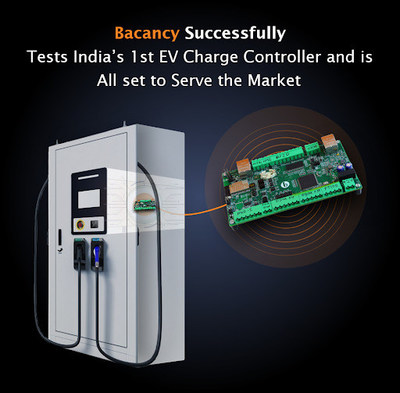Bacancy is a pioneer in product engineering and a leading embedded solution development company. The CCS2 Controller, known as CCS2CON, developed at Bacancy, is a smart solution for building fast DC charging for EVs.
AHMEDABAD, India, April 11, 2022 /PRNewswire/ — Bacancy’s CCS2 controller clears its testing phase with the most renowned EVs in the Indian market. The CCS2 controller, known as CCS2CON, is India’s 1st EV charge controller, designed for CCS type 2 charging. The EVs with which the controller was tested include TATA NEXON, MG ZS, Hyundai KONA, BYD E6, and Mercedes-Benz S 450 4MATIC.
The EV charge controller sets up a communication sequence between the EV and EVSE (Electric Vehicle Supply Equipment), ensuring 100% safety and battery protection during charging. The majority of the EV charge controller manufacturers are based in China. As of 2019, the EV charger market industry was valued at $3.8 billion, with anticipation to reach $25.5 billion by 2027, a report from allied market research suggests. With Bacancy’s CCS2CON, India will compete in the EV charger market domain for the first time.
“The entire credit goes to the team for burning the midnight oil throughout the development stage. From ideation to testing, we have thrived on putting the element of innovation & creativity at a lower cost than the current market players in the EV charge controller segment”
Hardik Sheth, CEO of Bacancy Systems.
Sequentially, the testing was conducted in a phased manner with the simulator first and then the EVs. A proto-charger was developed around the concept for holistic testing purposes. Bacancy has proved that the CCS2CON is the most viable solution for fast DC charging in the Indian EV charger market, despite facing initial challenges during the testing process.
The CCS2CON is compliant with ISO 15118 & DIN 70121 and supports a 30KW charger rating. Testing was carried out on a simulator for 10-12 charging cycles with sessions ranging from 1-2 minutes, making it robust and compliant with the most run Indian EVs for further iterations.
From a wide range of available options in the EV variants, the team decided to test the compliance with the MG ZS EV first. This EV initially had issues establishing the PLC communication but eventually was resolved with careful assessment and proper diagnostics.
Post the first successful attempt, the team decided to carry out testing on
TATA NEXON. NEXON, being ISO compliant, had timing issues in PLC communication. There were roadblocks initially, but once the team streamlined the communication sequence, it opened the gateways for the other EVs to pass through this proto-testing phase effectively.
With the effectiveness of the prior testing results, the testing phase for KONA, BYD & Mercedes-Benz S 450 4MATIC was performed without any hurdles.
“Our focus is always on adhering to the continuous improvement processes to build the most reliable, safe, and robust next-gen EV products in this rapidly evolving Indian EV market.”
Krunal Patel, CTO at Bacancy Systems
Image: https://mma.prnewswire.com/media/1794183/EV_charge_controller.jpg
Logo: https://mma.prnewswire.com/media/1794182/Bacancy_Logo.jpg

(Disclaimer: The above press release comes to you under an arrangement with PRNewswire India and this publication takes no editorial responsibility for the same)

